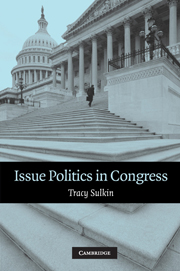Book contents
- Frontmatter
- Contents
- List of Figures
- List of Tables
- Acknowledgments
- Issue Politics in Congress
- 1 Electoral Challenges and Legislative Responsiveness
- 2 A Theory of Issue Uptake
- 3 The Nature of Campaign and Legislative Agendas
- 4 Assessing Uptake
- 5 Who Responds? Explaining Individual Variation in Uptake
- 6 Patterns of Responsiveness in Congress
- 7 The Electoral Impacts of Uptake
- 8 Uptake and Public Policy
- 9 Elections, Governance, and Representation
- Appendix: House and Senate Samples
- References
- Index
1 - Electoral Challenges and Legislative Responsiveness
Published online by Cambridge University Press: 08 January 2010
- Frontmatter
- Contents
- List of Figures
- List of Tables
- Acknowledgments
- Issue Politics in Congress
- 1 Electoral Challenges and Legislative Responsiveness
- 2 A Theory of Issue Uptake
- 3 The Nature of Campaign and Legislative Agendas
- 4 Assessing Uptake
- 5 Who Responds? Explaining Individual Variation in Uptake
- 6 Patterns of Responsiveness in Congress
- 7 The Electoral Impacts of Uptake
- 8 Uptake and Public Policy
- 9 Elections, Governance, and Representation
- Appendix: House and Senate Samples
- References
- Index
Summary
Going into his first reelection campaign in 1992, Senator Bob Graham was about as secure as any incumbent facing a challenge could hope to be. Though new to the Senate, he had a long history in Florida politics, including many years of service in the state legislature and two terms as governor. Endorsed by a host of newspapers and interest groups, he was described by many as the state's most popular politician, largely as the result of his reputation for action on environmental and economic issues of interest to his constituents (Duncan 1993, 321). During his active and well-funded campaign, Graham further leveraged these strengths by highlighting his competence and interest in the economy, the environment, and the proper role of governmental regulation.
In contrast, his opponent, Republican representative Bill Grant, faced an even greater uphill battle than most challengers. Hurt by his record of overdrafts at the House bank and his recent switch from the Democratic to the Republican Party, Grant experienced considerable difficulty raising funds, eventually raising only $200,000 to Graham's $3 million. Characterized by St. Petersburg Times political reporter Bill Moss as having “drive, but no fuel,” (1992, 1B) he nonetheless launched a spirited campaign against Graham, focusing on health care, economic issues, and the need for a balanced budget.
Not surprisingly, Graham won the race easily, netting nearly two-thirds of the vote.
- Type
- Chapter
- Information
- Issue Politics in Congress , pp. 1 - 18Publisher: Cambridge University PressPrint publication year: 2005



